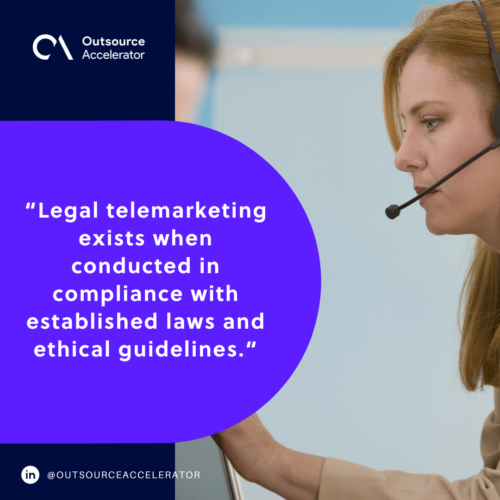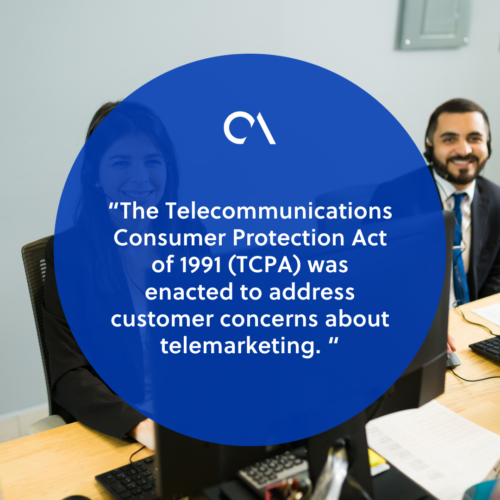Separating fact from fiction: Is telemarketing illegal?

Telemarketing is a familiar presence within the business realm. It’s also long been a contentious topic, arousing frustration and annoyance among many.
With the increasing number of marketing calls bombarding people’s phones, it’s only natural for questions to cloud the legality of this practice.
Is telemarketing illegal? Answering this requires delving into a complex web of regulations and laws.
This article sheds light on the legality of telemarketing by exploring common misconceptions about the practice and the mechanisms designed to protect consumers.
What is telemarketing?
Telemarketing is a form of direct marketing that involves reaching out to potential customers and clients through the phone. Phone calls occur, and a salesperson promotes, advertises, or sells products and services.
Telemarketing can be used for various purposes, including:
- Lead generation
- Conducting surveys
- Soliciting donations for charitable causes
Telemarketers often follow scripted messages during these calls to encourage recipients to take a desired action, such as making a purchase or providing contact information for follow-up.
This strategy has been used for decades to reach a broad audience quickly. However, in recent years, it’s been a subject of controversy due to concerns over privacy, nuisance calls, and, in some cases, deceptive practices.

Is telemarketing illegal?
We’ll establish it now; telemarketing is not inherently illegal. The industry is subject to a set of regulations and laws designed to protect consumers and ensure ethical business practices.
Telemarketing agencies must comply with these regulations to operate within the legal boundaries.
When conducted within legal compliance, telemarketing is as fair and lawful a practice as any job. Naturally, that doesn’t mean that illegal telemarketing practices don’t exist.
Violations include:
- Making unsolicited calls to numbers on the National Do Not Call Registry
- Engaging in deceptive sales tactics
- Failing to provide necessary information during a call
It’s helpful to be aware of these regulations in order to ensure a lawful and respectful telemarketing industry.
10 misconceptions about telemarketing
Telemarketing often carries a negative reputation due to several misconceptions associated with the practice. It’s important to separate fact from fiction when discussing “Is telemarketing illegal?”
Here is our examination of ten misconceptions about telemarketing:
1. Telemarketing is always illegal or unethical
Many people assume that all telemarketing is either illegal or unethical. While there are instances of deceptive or intrusive telemarketing practices, the truth is that the industry is regulated.
Legal telemarketing exists when conducted in compliance with established laws and ethical guidelines.

2. Telemarketing calls are always unwanted
While many people find unsolicited telemarketing calls intrusive, others may welcome them.
This can be especially true if the calls provide information about products or services that genuinely interest them. Consent-based telemarketing also happens when individuals opt to receive promotional calls.
3. Telemarketers are aggressive and pushy
This is a common stereotype, but in reality, many telemarketers understand that aggression and pressure tactics are ineffective in winning over customers.
Skilled telemarketers focus on building rapport, providing information, and addressing customer needs respectfully.
4. Telemarketing is ineffective
Some may view telemarketing as an outdated and ineffective marketing method. However, when executed properly, it can still be a valuable tool to generate leads and drive sales.
Success in telemarketing involves targeted strategies, personalizing calls, and providing compelling offers.
5. All telemarketing calls are scams
There is a misconception that telemarketing calls are automatically associated with scams. While there are instances of fraudulent telemarketing, not all calls are scams.
Legitimate businesses use telemarketing to engage with potential customers and promote their products or services. It’s essential to distinguish between lawful telemarketing and dishonest activities.
6. Telemarketers call at any time
Many people assume that telemarketers make unsolicited calls at all hours of the day, disregarding the recipient’s schedule.
However, reputable telemarketers follow regulations and guidelines that dictate specific calling hours and respect consumers’ privacy.
7. Telemarketers can always be blocked
In the US, the National Do Not Call Registry exists to reduce unwanted calls. However, it does not eliminate all telemarketing communication.
On a personal level, people may use call-blocking tools and features, but some telemarketers can bypass these measures. Additionally, blocking calls indiscriminately may prevent important or desired calls from getting through. 8. Telemarketing is only done over the phone
Telemarketing extends beyond traditional phone calls. The practice now includes communication through various channels such as text messages, emails, and social media.
Understanding the broader scope helps to recognize and address telemarketing in different forms.
9. Telemarketers have access to personal information
Privacy regulations bind telemarketers, who typically do not have unrestricted access to personal information.
Responsible telemarketing relies on consent and compliance with data protection laws to ensure customer privacy is respected.
10. Telemarketing is only about making sales
While telemarketing does involve sales efforts, it is not limited to making immediate sales.
In addition, telemarketing is employed in customer service follow-ups, market research, appointment scheduling, and consumer surveys. Its purpose extends beyond just closing deals.
Distinguishing between fact and fiction is crucial when asking, “Is telemarketing illegal?”
By dispelling these misconceptions, individuals can enhance their ability to navigate the complexities of the telemarketing landscape more effectively.
Federal rules for telemarketers
The Telecommunications Consumer Protection Act of 1991 (TCPA) was enacted to address customer concerns about telemarketing.

The TCPA requires that telemarketers provide the following information over calls:
- Their name
- Name of their business
- A phone number or address where the business can be contacted
Additionally, telemarketers are prohibited from calling before 8 am and after 9 pm.
The Telemarketing Sales Rule outlines further guidelines for telemarketers:
- They must state they’re making a sales call
- They may not misrepresent information about products, prizes, or investments
- They must be clear about the total cost of goods and services offered
If you’ve found yourself in a telemarketing scam, speaking with a consumer protection lawyer is recommended.
Staying informed on telemarketing regulations
Staying informed on telemarketing regulations is crucial for both consumers and businesses.
Understanding the legal framework surrounding telemarketing not only empowers individuals to protect their privacy but also enables companies to engage in ethical practices.
Is telemarketing illegal? You can rest assured that it’s not.
But remember, while telemarketing is a regulated industry, there may still be instances of illegal or unethical practices. As technology and consumer preferences continue to evolve, an ongoing commitment to awareness and education will play a pivotal role in its future.







 Independent
Independent




